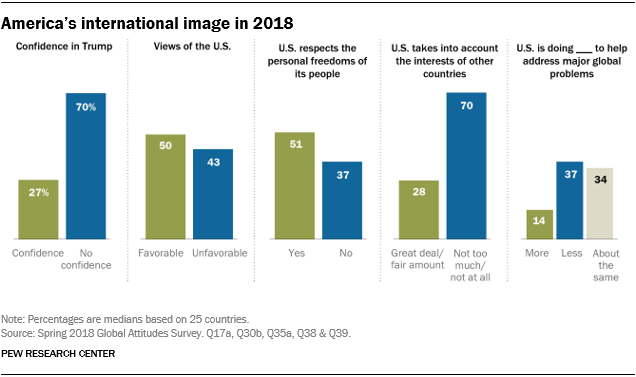The US and the World: Public Opinion Abroad and at Home
From Pew:

Around the world, publics are divided about the direction of American power: Across the 25 nations surveyed, a median of 31% say the U.S. plays a more important role in the world today than it did ten years ago; 25% say it plays a less important role; and 35% believe the U.S. is as important as it was a decade ago.
In contrast, views about Chinese power are clear: A median of 70% say China’s role on the world stage has grown over the past 10 years. Still, by a slim margin, more people name the U.S. as the world’s leading economic power (a median of 39% say the U.S., 34% say China).
And despite the unease many feel about the U.S. at the moment, the idea of a U.S.-led world order is still attractive to most. When asked which would be better for the world, having China or the U.S. as the top global power, people in nearly every country tend to select the U.S., and this is particularly common among some of China’s Asia-Pacific neighbors, such as Japan, the Philippines, South Korea and Australia.
At WP, Scott Clement and Dan Balz report on a new poll from the Chicago Council on Global Affairs.
The newly released survey shows majorities offering positive attitudes about the value of international trade, the Paris climate accord and the Iran nuclear agreement. A majority also agrees the United States should make concessions to other U.N. countries in the conduct of foreign affairs. Notably, support for these views has increased since a similar poll taken a year ago, with several attitudes changing among Republicans and independents as well as Democrats.
...
The survey, conducted in July among 2,046 U.S. adults, found that 70 percent of Americans say it is best for the United States to take an active part in world affairs, up from 63 percent in 2017 and 58 percent in 2014. At the same time, 57 percent say that this country has been losing allies over the past year, while 56 percent say relations between the United States and other countries have been worsening in general.
A separate question finds nearly 3 in 4 saying that it is more important for the United States to be admired than feared around the world. Yet when asked how the world sees the United States today, by 39 percent to 20 percent, more say it is feared than admired. Four in 10 picked neither of those two choices, preferring different characterizations. Overall, 13 percent volunteered that the United States is “laughed at” by other nations.
